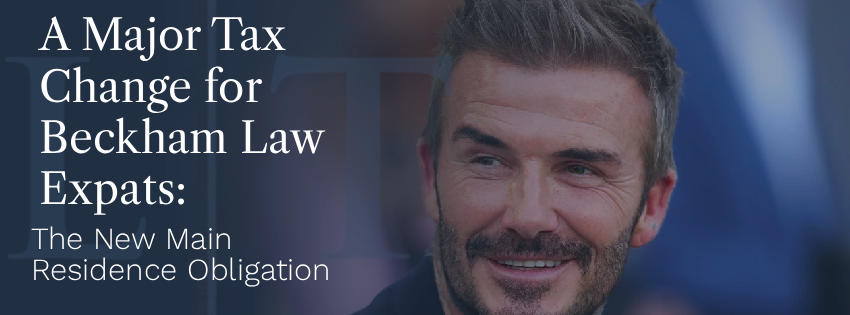Spain’s Beckham Law has long been a powerful incentive for foreign professionals, offering significant tax advantages. However, a recent and stringent interpretation by Hacienda (the Spanish Tax Authority) has introduced a major new liability: beneficiaries of the regime are now being required to pay imputed income tax on their main residence in Spain.
This shift represents an unexpected annual cost and a considerable risk for thousands of expats who were previously advised this tax did not apply. Forgetting this new obligation can lead to inspections, penalties, and significant financial complications.
This article explains what this new tax entails, who is affected, and how Lextax can protect your financial position.
1. A Refresher: What Is the Beckham Law?
Introduced in 2005, the Beckham Law (formally, the Special Tax Regime for Impatriates) allows eligible individuals relocating to Spain to be taxed under the more straightforward Non-Resident Income Tax (IRNR) rules for up to six years, despite being Spanish tax residents.
Key benefits include:
- Flat tax rate: 24% on employment income up to €600,000 and 47% on the excess.
- Territorial taxation: In general, only Spanish-source income is taxed, with most foreign-source income (like capital gains from shares or interest) remaining exempt.
- Wealth Tax: Only Spanish assets are considered for Wealth Tax, not worldwide assets.
While these advantages remain, Hacienda’s new stance on property taxation significantly alters the financial landscape for beneficiaries.
2. The New Obligation: Hacienda’s Tax on Your Main Home
Hacienda’s position is based on a strict interpretation of the law. Since Beckham Law beneficiaries are taxed under Non-Resident Income Tax (IRNR) rules, Hacienda argues that all IRNR rules must apply, including those for property.
This means:
- Imputed Income Tax is now mandatory for your main residence. The exemption for a primary home that applies to regular Spanish residents is, according to Hacienda, not applicable to Beckham Law users.
- You must declare an income even if you don’t rent your property. The tax is calculated on a notional «income» that the Spanish state assumes your property generates. This is typically 1.1% or 2% of the property’s official cadastral value (valor catastral).
- This results in a new annual tax bill that can amount to thousands of euros, depending on your property’s value.
3. Practical Impact and Risks for Expats
This change of criteria is not a minor issue. It carries significant financial and legal risks:
- Unexpected Tax Bills: You are now liable for an annual tax that was not part of your initial financial planning.
- High Risk of Tax Inspections: Hacienda is actively scrutinizing Beckham Law taxpayers to ensure compliance with this rule. Failure to declare this tax is a red flag for an audit.
- Penalties and Surcharges: If you fail to declare and pay, you will face late payment surcharges and potentially significant penalties on top of the original tax owed.
- Legal Uncertainty: Without a clear legal precedent contradicting Hacienda, ignoring this obligation is a risky strategy that leaves you exposed.
4. Key Questions Expats Are Now Asking
Do I really have to pay this tax?
According to Hacienda’s current and actively enforced criteria, yes. The tax authority is systematically issuing tax assessments to those who do not declare it.
How is the tax calculated?
It is calculated as a percentage of your property’s cadastral value (valor catastral). This percentage is then subject to the non-resident tax rate of 24%. Our team can calculate the exact amount for you.
What happens if I haven’t paid it in previous years?
Hacienda can review the last four tax years. You are at risk of receiving a notification demanding payment for all undeclared periods, plus interest and penalties.
Does this affect new applicants, like digital nomads?
Yes. This interpretation affects all beneficiaries of the Beckham Law, including those under the new, expanded regime for digital nomads, entrepreneurs, and highly qualified professionals.
5. How Lextax Protects You
Navigating this complex and evolving situation requires expert guidance. At Lextax, we provide security and peace of mind. Our services include:
- Compliance Review: We analyze your tax situation to determine your exact obligations and ensure you are fully compliant, avoiding any future surprises.
- Accurate Tax Calculation and Filing: We handle the calculation and filing of the imputed income tax, ensuring it is done correctly and on time.
- Defense During Inspections: If you are audited by Hacienda, our expert legal team will represent you to defend your interests and minimize liabilities.
- Strategic Tax Planning: We provide proactive advice to structure your assets and income in the most efficient way possible within the new legal framework.
6. Conclusion: A Time for Caution and Proactive Measures
The Beckham Law remains an attractive regime, but Hacienda’s enforcement of the main residence tax has introduced a serious complication that cannot be ignored. Proactive compliance is now the only safe strategy.
If you are a Beckham Law beneficiary, now is the time to:
- Review your tax status immediately.
- Calculate your potential liability for current and past years.
- Regularize your situation to avoid penalties.
Don’t wait for Hacienda to contact you.


